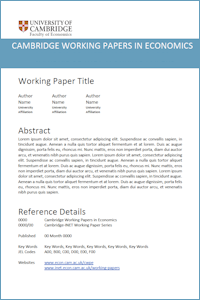
Chan, G. and Anadon, L-D.
Improving Decision Making for Public R&D Investment in Energy: Utilizing Expert Elicitation in Parametric Models
CWPE1682
Abstract: Effective decision making to allocate public funds for energy technology research, development, and demonstration (R&D) requires considering alternative investment opportunities that can have large but highly uncertain returns and a multitude of positive or negative interactions. This paper proposes and implements a method to support R&D decisions that propagates uncertainty through an economic model to estimate the benefits of an R&D portfolio, accounting for innovation spillovers and technology substitution and complementarity. The proposed method improves on the existing literature by: (a) using estimates of the impact of R&D investments from one of the most comprehensive sets of expert elicitations on this topic to date; (b) using a detailed energy-economic model to estimate evaluation metrics relevant to an energy R&D portfolio: e.g., system benefits, technology diffusion, and uncertainty around outcomes; and (c) using a novel sampling and optimization strategy to calculate optimal R&D portfolios. This design is used to estimate an optimal energy R&D portfolio that maximizes the net economic benefits under an R&D budget constraint. Results parameterized based on expert elicitations conducted in 2009-2011 in the United States provide indicative results that show: (1) an expert-recommended portfolio in 2030, relative to the BAU portfolio, can reduce carbon dioxide emissions by 46 million tonnes, increase economic surplus by $29 billion, and increase renewable energy generation by 39 TWh; (2) uncertainty around the estimates of R&D benefits is large and overall uncertainty increases with greater investment levels; (3) a 10-fold expansion from 2012 levels in the annual R&D budget for utility-scale energy storage, bioenergy, advanced vehicles, fossil energy, nuclear energy, and solar photovoltaic technologies can be justified by returns to economic surplus; (4) the greatest returns to public R&D investment are in energy storage and solar photovoltaics; and (5) the current allocation of energy R&D funds is very different from optimal portfolios. Taken together, these results demonstrate the utility of applying new methods to improve the cost-effectiveness and environmental performance in a deliberative approach to energy R&D portfolio decision making.
Keywords: decision-making under uncertainty, research policy, public R&D, energy R&D, energy technology
JEL Codes: O32 O38 G11 Q48 D81
Author links:
PDF: https://www.econ.cam.ac.uk/research-files/repec/cam/pdf/cwpe1682.pdf 
EPRG Paper Link: 1631
Open Access Link: https://doi.org/10.17863/CAM.7842
